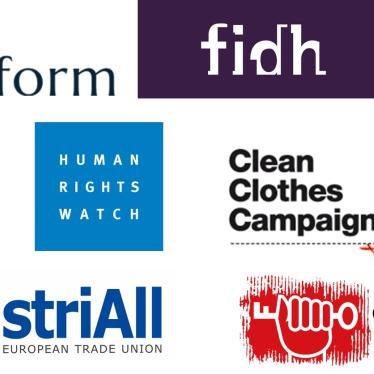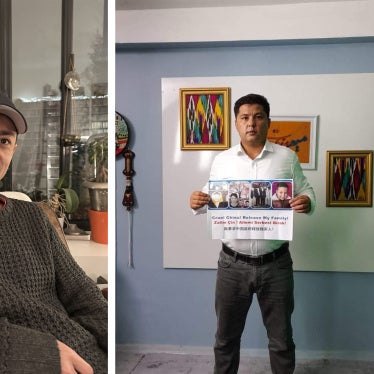To: Members of the Council of the European Union
27 February 2023
RE: Delete the reference to readmission as a conditionality in the draft GSP reform
Dear member of the Council,
We are writing in the context of the ongoing trilogue on the reform of the EU’s Generalised Scheme of Preferences (GSP) to urge members of the Council to reconsider and abandon the proposition to condition trade preferences for GSP beneficiary countries on their migration and readmission cooperation with the European Union (EU).
The GSP framework aims at promoting sustainable development in non-EU countries through a system of incentives and disincentives, linked to those countries’ compliance with human rights, including labour rights, and environmental protection standards.
Both under the current GSP system and in the Commission’s proposal for a new one, the Everything But Arms (EBA) and Standard GSP benefits are automatically granted respectively, to least developed countries and low and lower-middle income countries, with no obligation on their part. They can be withdrawn if beneficiaries are found to be in serious breach of key elements of the core human and labour rights conventions (negative conditionality). Only GSP+ is granted to vulnerable developing countries under the condition to ratify and effectively implement a range of international conventions pertaining to human rights, labour, environment, and governance (positive conditionality).
The European Commission’s proposal supported by the Council in Article 19 (1)c represents a sharp departure from the objectives of the EU’s GSP and from EU’s core values. It would effectively make the conclusion and enforcement of readmission arrangements the only positive obligation for the EBA and Standard GSP benefits, while there is still no positive obligation to, for instance, ratify human and labour rights conventions. It would also make readmission cooperation the only conditionality that is not linked to fair trade practice or human-rights based sustainable development.
The undersigned organisations have grave concerns about this because:
- It is counterproductive: It would prevent countries from benefiting from GSP arrangements that can effectively promote protection for human rights and alleviate poverty, repression and poor governance, conditions that can lead people to feel they have no choice but to leave their homes, and which are root causes of forced migration. While addressing those root causes is a priority of the EU, the proposed changes would jeopardize an effective policy tool to address them via trade preferences that support sustainable development in third countries;
- It is questionable whether it can be reconciled with WTO rules: the introduction of conditionality related to readmission is neither motivated by human rights nor by sustainable development objectives, and may not be in line with WTO provisions enabling differential and more favorable treatments;
- It is inconsistent with the overall framework of GSP arrangements: there is no connection between readmission policies and sustainable development, from which all positive and negative GSP conditionalities are derived. The revised GSP should focus on the importance of promoting the ratification and improving the effective implementation of listed conventions, rather than a punitive approach based on withdrawing tariff preferences;
- It will make the GSP scheme less effective: the objective of the GSP regulation is to foster compliance with human rights standards and support development in cooperation with third countries; by introducing the controversial issue of readmission in this context, the space for obtaining progress on human rights standards, climate change objectives, and sustainable development goals will shrink and the EU’s credibility to defend these standards globally will be reduced;
- It puts the partnership with third countries at risk: misusing the GSP framework to force governments, including those of least developed countries, to make concessions on a politically sensitive issue, due to, inter alia, the significant contribution that remittances make to their economy, will put at stake the partnerships that have been developed and encourage third country governments to look elsewhere for economic and development cooperation.
The revision of the GSP regulation is an important opportunity for the EU to bolster the contribution of trade to sustainable development – which is closely linked to poverty reduction, human rights, labour rights and environmental protection. Keeping a clear focus on this objective is crucial at a time of multiple interlinked crises, such as the food and climate crises, that are having devastating effects on developing countries.
We therefore urge the Council to protect the coherence of the GSP system and support the deletion of the reference to the obligation to comply with readmission from Article 19 (1)c or from any other operational paragraph of the draft regulation, as rightly proposed by the European Parliament.
Cordially,
ACT Alliance EU
Amnesty International*
Anti-Slavery International
Brot für die Welt
CARE International
Caritas Europa
Caritas International Belgium
Churches Commission for Migrants in Europe
Clean Clothes Campaign - International Office
11.11.11 - Coalition For International Solidarity, Belgium*
with the support of CONCORD Europe*
CSW
Danish Refugee Council
European Network Against Racism (ENAR)*
European Council on Refugees and Exiles (ECRE)
European Evangelical Alliance
European Trade Union Confederation (ETUC)*
GSP Platform
Human Rights Watch
International Federation for Human Rights (FIDH)
International Federation of ACAT (FIACAT)
Migration Policy Group
Terre des hommes Deutschland e.V.
Quaker Council for European Affairs (QCEA)
Oxfam
CC:
Josep Borrell Fontelles, High Representative and Vice-President
Valdis Dombrovski, Executive Vice-President and European Commissioner for Trade
Koen Doens, Director-General for International Partnerships (DG INTPA)
Sabine Weyand, Director-General For Trade (DG TRADE)
Monique Pariat, Director-General for Migration & Home Affairs (DG HOME)
Joost Korte, Director-General for Employment, Social Affairs & Inclusion (DG Employment)
Heidi Hautala, Member of the European Parliament, Rapporteur
Gabriel Mato, Member of the European Parliament, Shadow Rapporteur
Raphaël Glucksmann, Member of the European Parliament, Shadow Rapporteur
Jordi Cañas, Member of the European Parliament, Shadow Rapporteur
Marco Compomenosi, Member of the European Parliament, Shadow Rapporteur
Emmanouil Fragkos, Member of the European Parliament, Shadow Rapporteur
Helmut Scholz, Member of the European Parliament, Shadow Rapporteur







